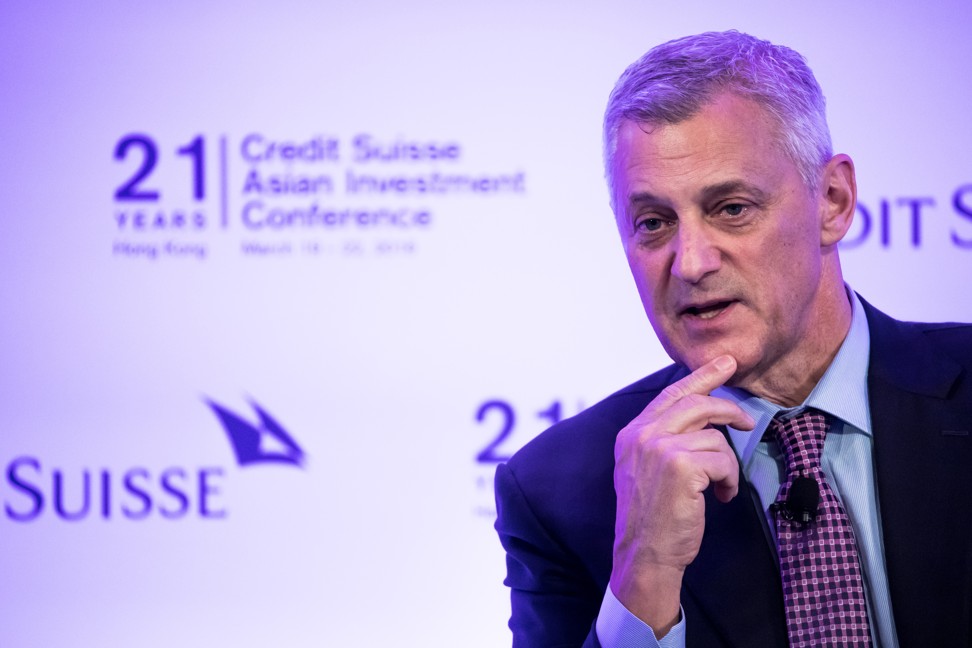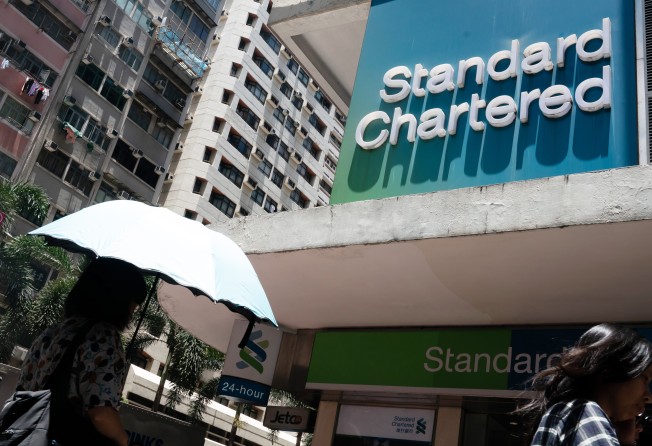
Standard Chartered looks to shed more costs, revamp its lower-return markets as it misses analysts’ forecasts
- The bank took a US$900 million provision for potential penalties related to past conduct
- Chief executive Bill Winters said it will be ‘a different looking and feeling bank’ in 2021

Standard Chartered, one of three banks licensed to print Hong Kong’s currency notes, said on Tuesday that it plans to shed US$700 million in costs in the next three years and use a combination of digitisation and potential partnerships to improve its results in its lower return markets.
The new strategic plan came as the bank posted its second consecutive full-year profit as part of a turnaround overseen by chief executive Bill Winters. It missed analysts’ estimates after it took a US$900 million charge for potential penalties related to inquiries by United States and United Kingdom regulators into its past conduct.
The bank, which is based in London, but generates much of its revenue in Asia, said that it would seek to further grow its international network operations - businesses built around cross-border transactions - and its businesses serving clients.
It also would look to use partnerships and technology to improve markets where the domestic business is generating lower returns: Korea, India, Indonesia and the United Arab Emirates. In Korea, for example, the bank also has been pivoting from the mass market to higher return products focused on wealthier clients.
There are no plans to exit those markets, which are important markets for its cross-border operations, Winters said.
As part of its efforts, Standard Chartered said it plans to list its joint venture investment in Indonesia’s PT Bank Permata as a non-core asset in the future - allowing the bank to reduce its risk-weighted assets - and focus on improving returns in its own domestic business there.
“This is a transformational plan,” Winters said on a conference call with journalists. “Standard Chartered will be a different looking and feeling bank.”
The 57-year-old chief executive, who took over from Peter Sands in June 2015, said he felt the bank had the right team and areas of focus to deliver results despite “some of the headwinds we expect we’ll face”.
Since joining the bank, Winters has overhauled Standard Chartered’s executive ranks, cut 15,000 jobs and sold a number of underperforming businesses.

The bank’s underlying pre-tax profit rose to US$3.86 billion last year, missing Bloomberg’s consensus forecast of US$3.98 billion by 3 per cent. Operating income was US$14.97 billion for the year, missing estimates of US$15.02 billion, while net profit fell 20 per cent to US$618 billion.
Standard Chartered’s net interest income increased 8 per cent to US$8.8 billion last year.
Operating expenses rose 3 per cent to US$10.5 billion in 2018, including a US$324 million bank levy imposed by the UK, the bank said.
Following the announcement, the bank’s shares ended the day in Hong Kong up 2.4 per cent at HK$64.50 amid a declining market. The shares, however, declined 2.4 per cent in afternoon trading in London. The stock price in Hong Kong has fallen 29 per cent in the past 12 months.
The bank, founded 50 years ago through a merger of two lenders, warned last week that it would set aside US$900 million in the fourth quarter to cover potential penalties related to a series of previously disclosed investigations, including scrutiny by the US Department of Justice into potential historical violations of American sanctions law and inquiries into its foreign exchange business and financial crime controls.
The bank previously agreed in 2012 to pay a settlement of US$1.9 billion to settle a US inquiry into the transfer of billions of dollars on behalf of Iranian clients and others facing American sanctions.
Standard Chartered has overhauled its compliance functions and established a board-level financial crimes risk committee since the settlement, but it has continued to face additional regulatory scrutiny.
Winters said that the bank was “cautiously optimistic” about the global macroeconomic environment despite a tit-for-tat trade war that has waged between the two world’s largest economies for much of the past year.
“The range of possible outcomes from an array of matters is wider than it has been in a long time. This creates uncertainty among policymakers as well as our clients,” Winters said. “We believe that as multinational companies grapple with the possibility that barriers to trade could rise and supply chains may be impacted, they will find it even more important to deal with banks like ours that have the sophistication, market presence and determination to help them navigate an increasingly complex world.”
Winters said that he believes the bank is nimble enough to use technology to be a disrupter, pointing to initiatives, such as a digital-only bank it is rolling out in Africa.
“We don’t have the challenges that many tech partners would expect to find in dealing with big local incumbents or even big global incumbents,” Winters said.
Andy Halford, Standard Chartered’s group chief financial officer, said that the bank has spent about US$1.5 billion on new technology since 2016 and expects to spend around those levels going forward.
Standard Chartered also said that it expects its Greater China operations to double in the coming years as the country further opens up its financial services to foreign lenders.
Standard Chartered’s operations in Greater China and North Asia reported a 14 per cent increase in pre-tax profit in 2018.
In Hong Kong, underlying profit before tax rose 14 per cent to US$1.6 billion, the bank said.
The company, which employs about 85,000 people worldwide, plans to achieve a return on tangible equity of at least 10 per cent by 2021. It had a return on tangible equity of 5.1 per cent at the end of 2018, below its prior target of 8 per cent.
Ian Gordon, a banking analyst with Investec in London, said that Standard Chartered’s return on tangible equity target “looks optimistic”.
“We welcome a number of initiatives intended to tackle specific areas of performance,” Gordon said. However, the US$700 million in cost-cutting will not “actually represent any net cost reduction” because of Standard Chartered’s plans to reinvest in its business, he said.
Standard Chartered said it intends to distribute to shareholders any surplus capital that is not deployed to pursue additional growth opportunities.
The bank, which resumed paying a dividend last year, said it would pay a dividend of 21 cents a share for the full year.